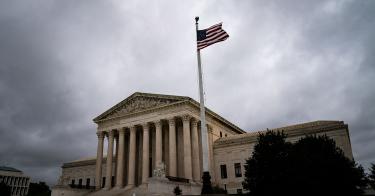“Those who cannot remember the past,” wrote philosopher George Santayana, “are condemned to repeat it.” Ignorance of the past is bad enough, but current attempts to politicize our courts are a deliberate attempt to compromise the judicial independence that America’s founders said is “peculiarly essential” for the liberty we have enjoyed.
The “injuries and usurpations” by the British king cited in the Declaration of Independence included making judges “dependent on his Will.” The U.S. Constitution took steps to address this by letting federal judges serve for life and blocking Congress from cutting judicial pay. That kind of structural protection, as well as the more general separation of powers into three branches, safeguards judges’ independence in making their decisions.
In October 2011, Justice Antonin Scalia testified before the Senate Judiciary Committee about the role of judges under the Constitution. He explained how other countries also have written constitutions, but those written words mean little without an independent judiciary. Maintaining the right structure of government, Justice Scalia argued, prevents too much power from ending up in too few hands. This is what makes judicial independence, Chief Justice William Rehnquist said in a 1996 speech, one of the “crown jewels” of our system of government.
Today, however, there’s a plot to steal this crown jewel by those who seek power rather than liberty. For them, judicial independence is an obstacle to be overcome rather than a principle to be defended. In their system, judges decide cases in order to advance certain political interests and that end justifies whatever judicial means will achieve it.
>>> “Ethics and Recusal Reform” Is the Spin; Politicizing the Courts Is the Plan
Part of this strategy is to attack unfavorable results as illegitimate, partisan or even corrupt. Commentators and, increasingly, members of Congress rail against decisions they don’t like without ever explaining why those decisions might be wrong as a legal matter.
It’s only a small step from arguing that the Supreme Court exists to produce politically favorable results to threatening negative consequences if it doesn’t deliver the goods. In August 2019, for example, several Democratic senators filed a friend-of-the-court brief in a Second Amendment case that was anything but friendly.
The senators wanted the Supreme Court to uphold the strict gun control law being challenged in that case. Any other result, they wrote, would prove that the court “is not well” and might need to be “restructured.”
Less than a year later, Senate Majority Leader Charles Schumer, New York Democrat, was on the Supreme Court steps as an abortion case was being argued inside. He singled out Justices Neil Gorsuch and Brett Kavanaugh, threatening that they would “pay the price” and “won’t know what hit you” if they failed to side with the abortion rights advocates who brought this challenge.
Some tactics appear less jarring. Last year, for example, President Biden created a commission to explore “reforming” the Supreme Court. (See testimony by my colleague John Malcolm here.) Unlike virtually every other presidential commission on any subject, however, this one neither identified a particular problem that needed attention nor offered any recommendations for change. As a result, it fostered a general feeling that something is wrong over at the court.
>>> 9 Key Cases Supreme Court Will Hear in 2022-23 Session
This strategy is having the desired effect. Over the past year, several polls have found that more than 60% of Americans believe the Supreme Court decides cases based more on the justices’ personal politics than the law. Overall approval of the Supreme Court is at a record low.
Here’s a real irony.
Sen. Edward Markey, Massachusetts Democrat, introduced a bill to pack the Supreme Court by adding four unnecessary seats that he hopes would be filled with justices likely to vote for results he favors.
Mr. Markey’s attack on judicial independence would contradict his own state’s constitution, which in 1780 established a structure of government with an independent judiciary “to the end that it may be a government of laws and not of men.”
This piece originally appeared in The Washington Times



